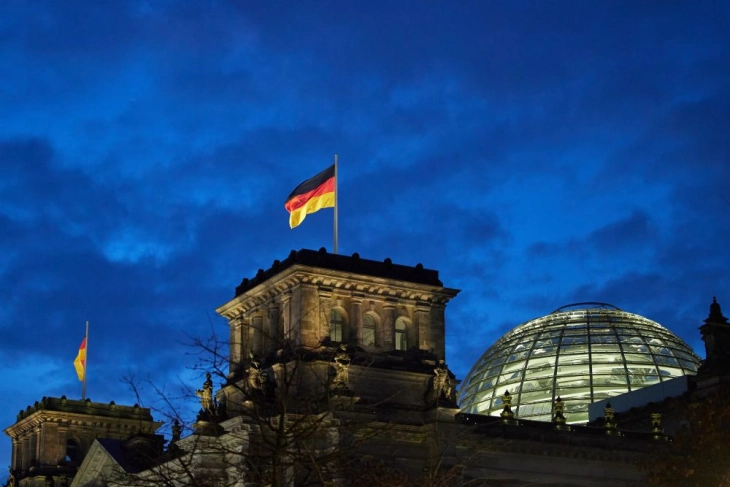Germany braces for swing to the right in pivotal election
- German voters are casting their ballots on Sunday in pivotal parliamentary elections, with Europe's biggest economy and the European Union's most populous country expecting a major shift to the right.

Berlin, 23 February 2025 (dpa/MIA) - German voters are casting their ballots on Sunday in pivotal parliamentary elections, with Europe's biggest economy and the European Union's most populous country expecting a major shift to the right.
The opposition conservative bloc has consistently polled highest in the months leading up to the vote. A win would almost certainly lead to Christian Democrat Friedrich Merz replacing centre-left Chancellor Olaf Scholz, whose three-way coalition spectacularly collapsed in November.
Meanwhile, polls indicate the vehemently anti-immigration Alternative for Germany (AfD) will come in a strong second and achieve the best result for a far-right party in Germany's post-Nazi history.
But all mainstream parties, including Merz's Christian Democratic Union (CDU) and their Bavarian sister party, the Christian Social Union (CSU), have previously ruled out cooperating with the far right, meaning in all likelihood the AfD won't be invited to join coalition talks.
With the AfD forecast to win about a fifth of the vote, the key question after the results come in will therefore be what coalition options are available - and just how long and difficult negotiations will be to assemble Germany's next government.
It took Scholz 73 days from election day to form his three-way coalition in late 2021, but this time around it could take much longer.
Other European countries contending with the rising power of the far right will be watching the results out of Berlin carefully, as will the new administration in the White House. Presidential adviser Elon Musk and Vice President JD Vance stunned many Germans recently by backing the AfD.
Polling stations opened at 8 am (0700 GMT), with exit polls expected to come out as soon as polls close at 6 pm.
Migration-dominated campaign
The brief campaign was dominated by a heated debate about migration amid a string of deadly attacks in which the main suspects are immigrants.
As recently as Friday, a Spanish tourist was stabbed at the Holocaust Memorial in Berlin, prompting Interior Minister Nancy Faeser to call for the suspect, a 19-year-old Syrian refugee, to be deported.
Prosecutors believe the attack was motivated by anti-Semitism.
Merz put himself at the centre of the political storm when he pushed through a non-binding motion with the support of the AfD calling for a crackdown on migration in the wake of a stabbing in Bavaria.
The move sparked nationwide protests, with demonstrators accusing him of tearing down the political "firewall" against the AfD, which is being monitored by domestic intelligence as a suspected far-right extremist group.
Shrinking economy seeking fresh boost
The poor state of Germany's economy has also weighed on voters, as a growing number of workers face the threat of lay-offs.
Germany is currently in the midst of its longest recession in more than two decades, and households are feeling the pinch of a tough wave of inflation that took off after Russia's full-scale invasion of Ukraine in February 2022.
US President Donald Trump's threats of tariffs on the EU, his loud demands for greater defence spending from European NATO allies and his push to cut a deal over Ukraine with Russia will all demand a serious response from the next German chancellor.
Scholz's future in doubt
Scholz and his Social Democrats (SPD) are languishing in third place at around 16% following three years of leading a squabbling coalition with the Greens and the pro-business Free Democrats (FDP).
The FDP is now among several smaller parties fighting to clear the 5% threshold usually needed to take seats in the Bundestag, as the lower house of parliament is known.
Months of wrangling over economic policy, including disagreements on how to finance the budget, led Scholz to dismiss FDP finance minister Christian Lindner in November, resulting in the fractious alliance's implosion and Sunday's early elections.
The possible coalition options will depend in part on how many parties fail to clear the 5% hurdle, with all available seats distributed among the successful parties.
A stable majority would be more easily in reach for the centrist parties if the FDP, The Left - on the far left of the spectrum - and the populist Sahra Wagenknecht Alliance (BSW) fail to make it in.
However, in that scenario the AfD's overall share of seats would also be bigger, potentially giving them enough votes in parliament to block constitutional amendments.
Some 60 million voters are eligible to cast two ballots - one for a party and one for a candidate in their constituency, under a complex electoral system that can mean the final distribution of seats is only clear after all results are in.







